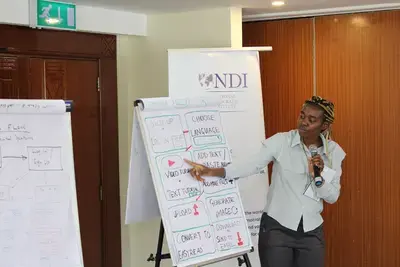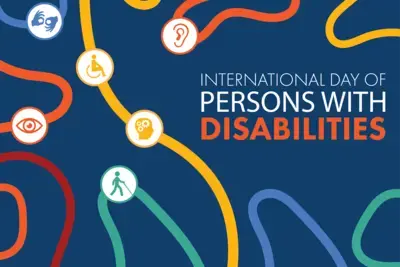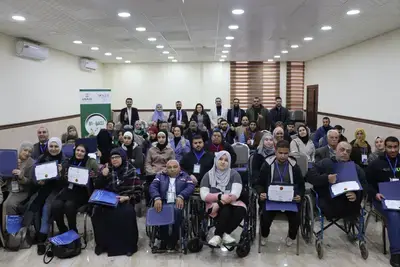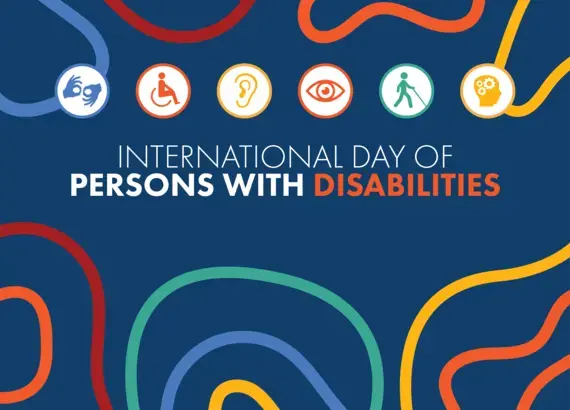
Success Story
Partner Profile: Mongolian National Association for Wheelchair Users
In recognition of the International Day of People with Disabilities, NDI is highlighting the essential work of partners who are at the forefront of fighting for greater levels of equality and organizing to shift social norms and perceptions and reduce barriers to political participation for persons with disabilities.
NDI interviewed the Mongolian National Association for Wheelchair Users (MNAWU), a partner advocating for the rights and equal opportunities for people with disabilities in all aspects of civic and political life in Mongolia. MNAWU conducts voter education for people with disabilities, trains political parties on disability inclusion, and advocates for the rights of people with disabilities to vote and run for office. MNAWU explained how they are working to facilitate inclusive political participation and amplify the leadership of persons with disabilities in Mongolia.
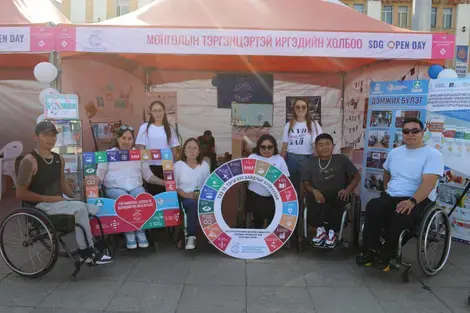
MNAWU members participate in the Sustainable Development Goals (SDG) Open Day in Mongolia to raise awareness about mainstreaming disability in the SDGs and mobilize collective action towards achieving the SDGs.
What does disability leadership mean to you/your organization?
We define disability leadership as raising awareness of the abilities and strengths of people with disabilities and conveying their voices to reduce negative societal perceptions. The definition also involves contributing to creating an accessible society for all which ensures the participation of people with disabilities by identifying ways to solve challenges based on our own experiences.
How is your organization working to amplify the leadership of persons with disabilities in your country or region to achieve a more equitable and inclusive future?
Our organization is working to strongly convey the voices of people with disabilities and provide opportunities to be empowered and grow together by organizing them into groups. We believe that it is stronger to convey our voices together than to convey our voices individually.
How can the disability movement diversify its leadership to ensure equal representation of women and girls with disabilities, persons with albinism, persons who are Deaf, and persons with psychosocial and intellectual disabilities?
Our organization primarily focuses on conveying the voices of women with disabilities, people with intellectual disabilities, and youth with disabilities who reside in remote areas or who need more social support in society.
In the past year, can you briefly share a success from your organization’s contribution to strengthening the disability movement?
We worked on increasing the right to run for office and be elected, and the political participation of people with disabilities. For this initiative, we trained 28 people with disabilities to deliver electoral education. The trainers designed and implemented activities to enhance electoral knowledge of people with disabilities residing in Ulaanbaatar city and two provinces. MNAWU reached a total of 640 citizens, including women with disabilities, teenagers, and people with intellectual disabilities.
We also assessed the accessibility of polling stations and provided recommendations for improvement. As a result, the accessibility of rural election polling stations improved by 25% compared to those used during parliamentary elections, demonstrating a positive outcome.
MNAWU also developed video content that shows effective methods for supporting voters with disabilities. These videos were developed and distributed to people with disabilities, election commission staff, and the public.
As a result of these initiatives, for the first time, two candidates with disabilities were elected in the regular 2024 parliamentary elections.
What impact has NDI’s partnership had on your organization?
In 2024, NDI supported and funded our “Right of People with Disabilities to Elect and Be Elected” project. As part of this project, we established 14 support groups for people with disabilities. Four groups were formed in remote regions, while four groups were formed for men, women, people with visual disabilities, and people with hearing disabilities. Six groups were formed for people with all types of disabilities, including the people with intellectual disabilities, in Ulaanbaatar. These groups engaged a total of 160 people. Group participants organized meetings to provide electoral education to 640 people with disabilities from rural areas.
We also developed guidebooks to provide electoral education to people with disabilities, empowered 28 trainers with disabilities, and produced “The Rights of People with Disabilities To Be Elected” video content. These videos showed the methods and instructions for making polling stations accessible to political parties and election commission staff.
MNAWU assessed the accessibility of polling stations during the parliamentary and local elections and submitted a report on our findings to the General Election Commission and the National Human Rights Commission of Mongolia. Currently, we are implementing advocacy efforts to integrate the voting and electoral rights of persons with disabilities into the policies and legislation.
NDI’s partnership not only covered the project activity costs but also helped us to cover costs such as office rent, staff salaries, taxes, and communication expenses which provided us with a favorable environment to focus entirely on achieving the project’s objectives.
In addition, our organization learned to expand its operational scope, make a broader impact, and bring changes. As a result, our organization’s reputation has grown and we have gained increased recognition from government organizations, and domestic donor organizations which we are extremely grateful.
